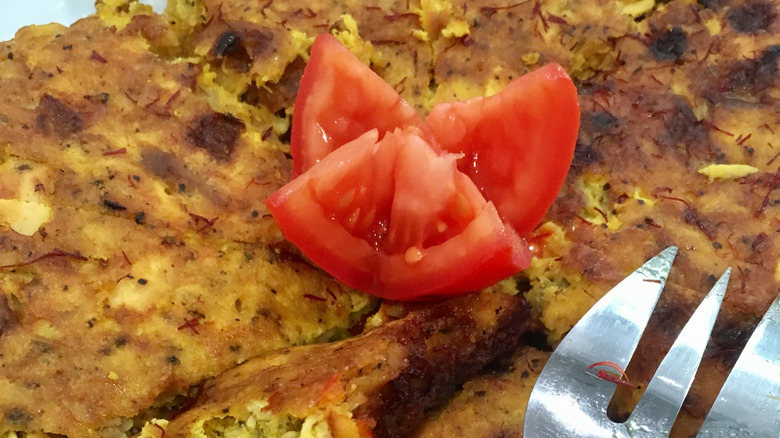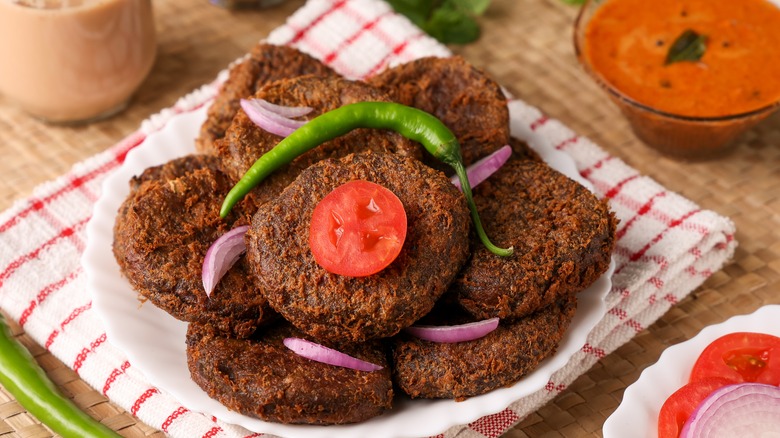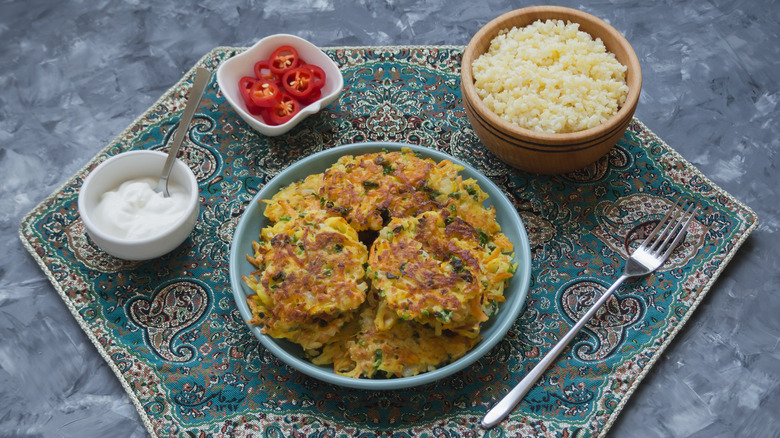Kotlet: The Origin Of The Iranian Meat Patty
Popular in Middle Eastern cuisine, kotlets are breaded patties made with ground meat and mashed potatoes. The patties are fried to a golden brown and served warm as a main course along with a variety of side dishes, or cold, as a sandwich. Kotlets originated in Iran, where they are a popular staple also called Persian cutlets. Ancient Iran was originally Persia, which explains the name.
Think of kotlets as flattened meatballs that have been sizzled to a delicious bronze. To make traditional kotlets, ground meat (usually beef or lamb) is mixed with mashed or riced boiled potatoes, various spices and seasonings, and sometimes eggs. The mixture is formed into patties, which are given a light dusting of flour or breadcrumbs, and then fried until they are golden and crispy. The ground meat and potatoes give the interior a soft, creamy texture, and the coating fries into a crisp outer shell. Spices like turmeric and advieh imbue the patties with a deep, earthy umami. Versatile kotlets are served in a variety of ways, from piping hot to cold out of the refrigerator, as a full meal or a grab-and-go snack.
Compared to many Middle Eastern dishes, kotlets are a fairly recent creation. Although several much older dishes, such as kafta or biryani, are similar, kotlets weren't invented until the early 1800s, when a British ambassador introduced potatoes to the Persian royal family.
How Persian kotlets got their name
The exact origin date of kotlets is hard to pinpoint, but kotlets couldn't have been created before potatoes were introduced in the former Persia, back in the 19th century.As far as the origin of the word "kotlet," it's possibly a regional variation of the French word côtelette, which means a small chop of meat — think "cutlet." However, although the French language may have played a part in naming the dish, kotlets are an Iranian food through and through.
In Iranian cuisine, there are many different types of fried patties, both meat- and vegetable-based. Kotlets simply took time-honored traditional dishes and used a similar cooking approach with a new resource — potatoes. Thus kotlets were created, and different chefs have put their spins on the dish throughout the years since.
With approximately four million Iranians living abroad, the popularity of this dish extends beyond its traditional borders. A popular dish to make at many family gatherings, kotlets are sometimes called "Persian healthy hamburgers" by Iranians living in North America because they are mostly made of potatoes, not meat.
A world of kotlets and cutlets
In its basic iteration, a kotlet is ground meat combined with potatoes. Traditionally, the meat was either lamb or beef, with chicken and turkey becoming more common and more popular over time. Although eating pork is forbidden in the Muslim faith, a pork kotlet is available in other parts of the world.
In Iran and elsewhere in the Middle East, you can find regional variations on kotlets. For instance, in the city of Karaj, kotlets are made with shredded raw potatoes instead of potatoes that have been boiled, which gives the dish a markedly different texture. In Azerbaijan, kotlets commonly contain chickpeas, which give a creamy texture and nutty taste to the patties. This version is said to resemble a similar dish called Shami kabab, which also has chickpeas in the mix. You can use kotlets like one would deli meat, as a base for a sandwich. Kotlet sandwiches are served in a variety of breads, from baguettes to pita.
Kotlets are often compared to cutlet dishes in other cultures, such as German or Austrian schnitzel-style pork cutlets, which are also breaded and fried meat patties. In India, recipes for similar-style cutlet patties, such as curried chickpea and lentil patties, are popular vegetarian takes on kotlets.


